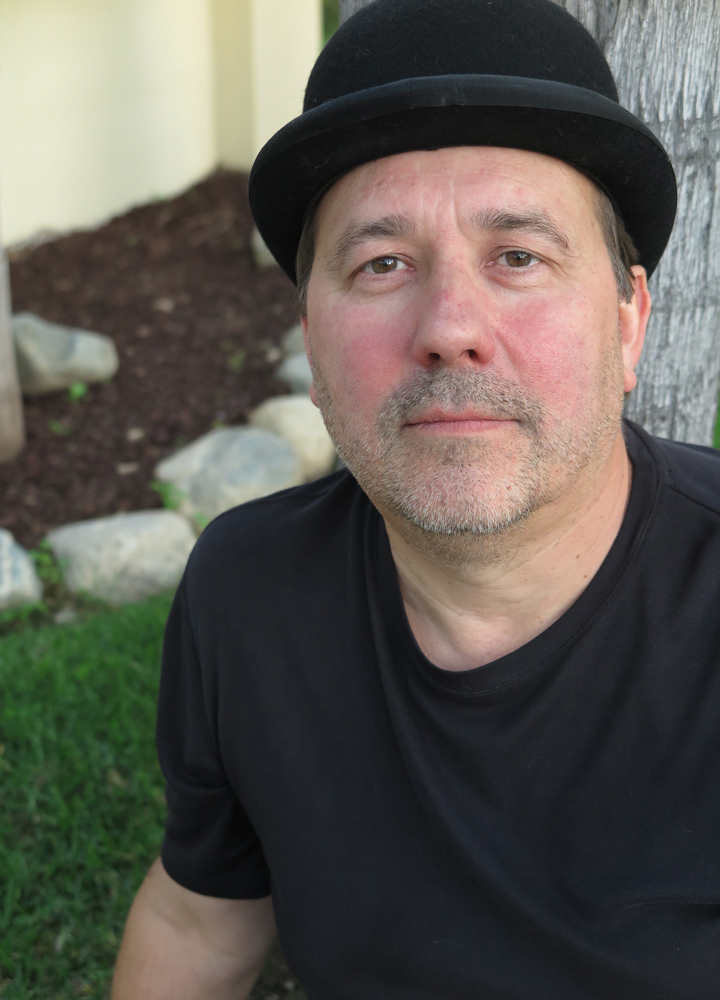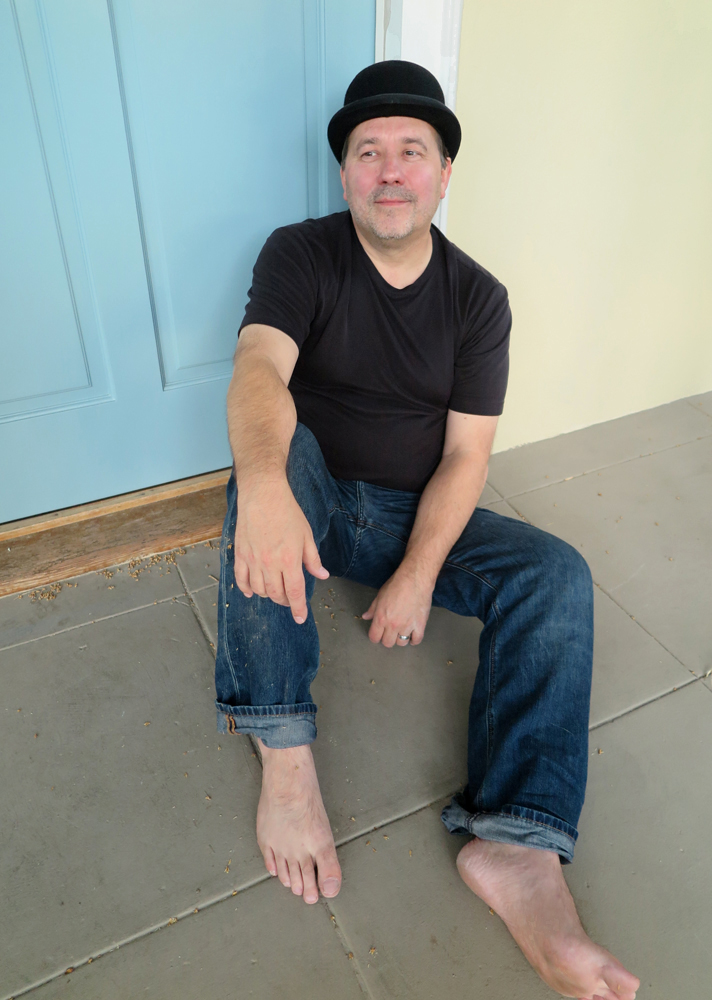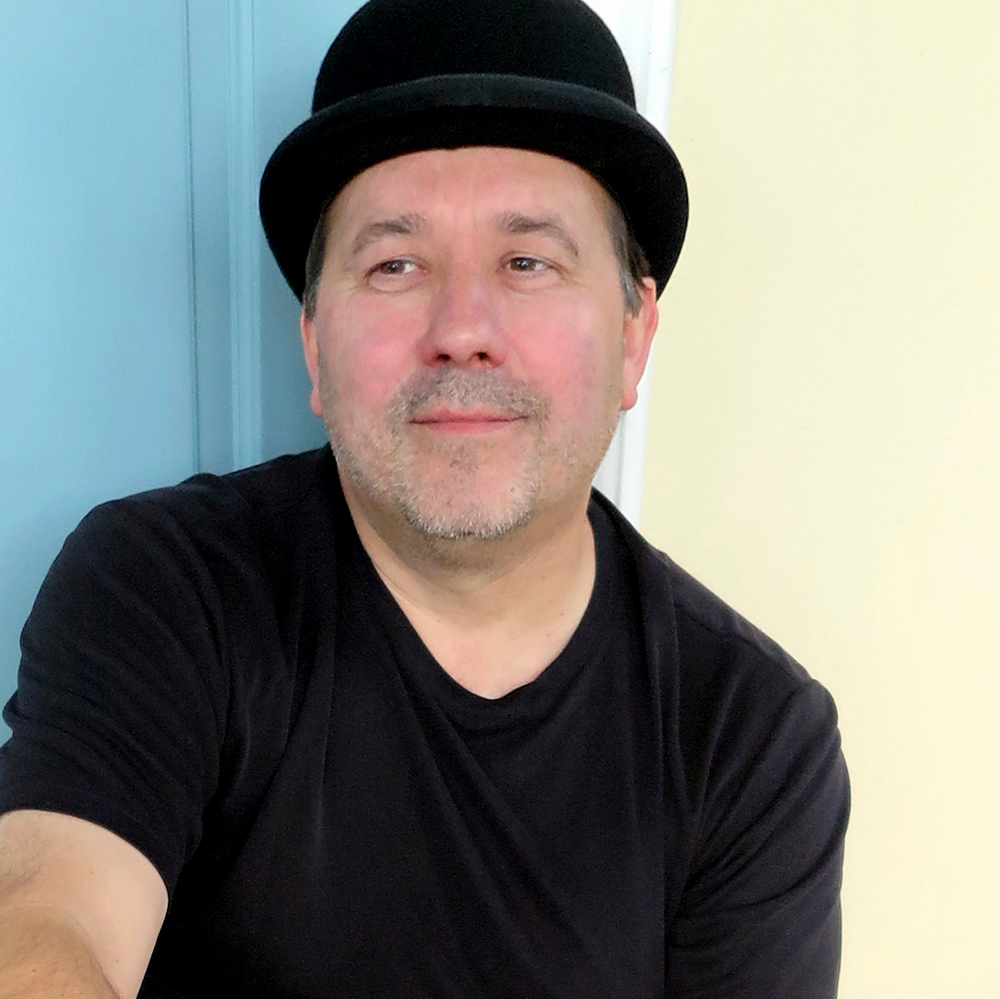|
There is a current of old world tension and modern angst captured in the music of Alan Hanslik and that energy, as embodied in his debut radio single ‘Kick It’, has got listeners enthralled. It's time the world learned more about this intriguing dance / electronica artist.
Some artists try to scale their way to the top of the music industry by personal flamboyance (or inscrutability). Others work the business like hardened politicians and hope that money and fame will redeem whatever compromises are made along the way. But a very few can do it by a golden amalgamation of originality, musicianship and talent. Alan Hanslik is such an artist. Currently residing in Monrovia, California, Alan Hanslik has been fast attracting recognition and honors, and one recent critic's account of his award-winning work probably explains why: ‘Ominous but expectant, ‘Kick It’ deftly deploys rumble filter effects and lucid synth arpeggios to deck out a nervy, capable groove.’ You can hear the authenticity in every chord of his new dance / electronica single, which undoubtedly explains its rapid ascent up the charts. Independent reporter Lily Clark recently caught up with Alan Hanslik to talk about his history, musical influences and exciting plans for the future.

LILY: As an artist on the rise, what is one thing you are most excited about and one thing you are most afraid of happening in your career?
ALAN HANSLIK: It is the one thing, the original reason and continues to be why I love being a composer and love to create compositions. I love the process - the actual doing it; of sitting down and creating a song from your head, from ideas, influences and dependent on how you’re feeling that day and what you’ve done before and a million other variables that fall together that suddenly allows us to compose a good song that day. As artists and musicians, we have to understand and believe in ourselves and create from inside in a sincere way. In some ways, this is easier when you’re unknown and you’re in your studio just writing and not worrying about anything outside. With the acknowledgement of a career and notice and people really liking your music, these things could affect you and how you work. Not that this is a bad thing, but it may introduce outside influence that may change, interrupt or get in the way of your creative process that must always be real and true if it’s going to work and ultimately end up being good.
LILY: Your song ’Kick It’ is receiving a positive listener response on radio. What was your initial reaction when you first heard your song playing on radio?
ALAN HANSLIK: Hearing my own music out to the public is definitely surreal. I think we all do and must tell ourselves our music is good, but to really have that acknowledgement and hear something we created – in our basement, from our heads and hearts be out there with tons of other music that we also listen to, love and admire from other artists is a reality check and does hold amazing value in a very real way for me.
LILY: What was the inspiration behind your debut radio single?
ALAN HANSLIK: When I compose with synths on the electronic side, I have access to so many great samples and sounds to select from and to then tweak and tune and find a way to use in a composition. Kick-It came from a series of amazing sound sources that at the base were some great rhythm tracks and cool drum beats. In some ways this song was a departure for me; though I played drums and rhythms are strong part of my compositions, I don’t tend to write around them. I’m usually much more lost and consumed by harmony and melody structures as the focus of my songs. For Kick It though, these sounds and ability to write something so strong, interesting and powerful was too much to pass up and through a series of a few weeks and iterations of the song, I finally pulled together what seemed to be so many sounds that intertwined in complete structure of a song that has a real beginning, middle and end with many passages of highlights and subdues along the way.
LILY: It is often said that great art arises from difficult experience. Is there something in your life experience thus far that you would describe as the ‘catalyst’ or ‘fuel’ for your desire to create music?
ALAN HANSLIK: I think for the lucky artists life experiences, difficult or not, allow them to find out what they want, love and can do with their lives. I do think that all life experiences help us, if we’re open to it and help us find our way down the path we were destined to be on. For me, I grew up not only playing music at a young age, but also listening to music throughout my life. I can relate life experiences by the songs and music and moods that they created in my life including just yesterday. So, for me music and creating music is what life ends up being about. That doesn’t mean I’ve always done it or that it’s easy, but if we could understand our real essence, there’s no doubt music is it for me.
LILY: How would you characterize yourself as an artist/musician? (Ex. Down-to-earth, serious, fun-loving, complicated…)
ALAN HANSLIK: I’m sure my wife would be better suited to answer how I’m characterized. From my perspective, I guess I would say I have always been driven, serious in my endeavors no matter what they were. At times in my life, probably younger, I was fun, silly and much less grown up overall. I do think I’m complicated, but yet probably like many other artists and musicians, holding my art with some importance throughout your life and career can be difficult. It does take a very strong commitment and sometimes very tough choices to put yourself and your art first over everything else. Being a musician, I love music in every facet, from a listener perspective I admire many musicians and composers who truly love every aspect of doing it.
 |
|
 |
LILY: What has your experience been like working with the other people on your team?
ALAN HANSLIK: Everyone that I have worked with and choose to work with is fantastic. Musicians and songwriters always have their own thing and view of the world and it doesn’t have to be the same as yours. That maturity and understanding allows a musical connection that can be more powerful than language and intimacy. People that are around me that support and encourage me with candid feedback about my music and songs are so invaluable and I appreciate all who love music and certainly those that give mine a chance even if they aren't their most favorite songs.
LILY: Did you come from a musical background? Are there other musicians in your family?
ALAN HANSLIK: I definitely came from a musical family. My Dad played accordion, my Mom painted and play organ, too. He had us all take up instruments and there were instruments and music being played in the house at all times. We had pianos, organs, drums and a host of other instruments. Along with that, music was always being played – in that day from the Beatles to EWF, classical and everything in-between. Both my brother and sister play clarinet and moved to piano and keyboards. They were flutes and sax and bands and other musicians coming over and playing. I had opportunities to play music when I was young with my Dad and brother's bands and with lots of close musicians that were around at the time.
LILY: What do you find most rewarding about being an artist? What do you find most challenging?
ALAN HANSLIK: There is pure enjoyment in creating and writing music, for me. Not that it always comes easy, but the reward of composing something brand new that comes from yourself is a unique feeling that you don’t get from many other things in life. Being an artist and musician along with performing and having feedback and acknowledgement that other people relate, react and listen to your music that provides them enjoyment is wonderful. Creating can certainly be elusive at times. You can’t force it; you can’t necessarily even control it or what comes out of it. That’s part of understanding the process and coming to terms with it, and allowing it to have it’s own life and path is very important. Sometimes the strongest idea that’s in your head and that you expect to come out can lead to disappointment and failure. I personally allow this part of the process to just happen. Sometimes the most brilliant things transpire when you’re not thinking and/or not over thinking what you’re trying to do. I always remember a Pat Metheny quote when he was asked on what he was thinking at the time of his best performances he said, ‘absolutely nothing at all’. That’s the ‘zone’; the times when creativity comes out seemingly without effort and can do amazing things.
LILY: Who are your role models in music?
ALAN HANSLIK: I grew up with so many influences from listening to what my older brother listened to in the 70’s that included pop, funk, Motown, jazz, rock, etc. In that time and in the 80’s there were arguably hundreds of great bands and musicians and all of them on the radio, being played all the time. From high school, I found my early love of jazz and loved listening to fusion, contemporary and was studying big-band jazz on drums. For me in jazz there’s too many to name, Pat Metheny, Dave Weckl, Chick Corea, Al Jarreau, Michael Franks along when the new breed of greats like Robert Glasper, Roy Hargrove, Elaine Elias, Brad Mehldau and such cool artists like James Moody, Nils Korgh, Nicholas Payton and so many more.
LILY: Describe your best or most memorable performance.
ALAN HANSLIK: Most of the time composing is a bit of an experiment. Typically, it’s try and see what happens on a given day and then just keeping at it, trying different things, making adjustments and spending enough time and focus until it all comes out – or it doesn’t. Other times you may start simply with a base of chords, or a motif that is at the core of the song or simple short melody and sometimes-wonderful harmonic changes start happening and it comes together. On those few occasions when all the elements come together, it’s almost easy to create something that is extraordinary. For me, those happen by myself in my studio and are only a few songs and compositions to date that I personally appreciate on a different level then all the rest.
LILY: What advice would you give to young, aspiring artists out there who are unsure and need guidance?
ALAN HANSLIK: I assume I would say what others would advise. Growing up in America, at least when I did you were told that you should be you; it’s ok and good to be different and unique. In reality, there are more outside pressures around you that encourage and even force you to fit in and be like everyone else. For an artist and musician, you need to understand who you are and what things have meaning for you. It’s an absolute necessity and you can only do that if you’re brave enough to know and be yourself. There is a process for us to each figure out how to find that and get there - how to tap into yourself as a musician and a to really create something new. This happens when you discover what you can create and that always comes from you in a real way. That’s the reality of being a person, an artist and creating as a musician and living your life with all it brings. Those things can all come together and if you let it, lead to creating art and music that is intimate and personal to each person.
LILY: What's next for you as an artist? Is there a new single in the works? If so, what can you tell us about it?
ALAN HANSLIK: I have a number of things going on right now - each one of them pretty exciting and different. I try to let myself create on many different levels and feel there is absolutely no reason to be locked into just doing one thing. I do think I have better affinity or maybe it’s more natural for me to be doing multiple things on different creative levels at once. In some ways it’s easier to stay more creative and keeps things fresher when you do that. I have just released another Techno/Electronica single called I Spy. It’s very different and I wrote it quite differently too. It’s a soundscape song with moods and sounds that you can envision as you take a journey. I created a rhythm track first and played (very loudly) all kinds of sounds and patches with structures in mind for hours. Then I really built the song in the editing phase, going through each section and picking out those tones and textures that I liked and then worked to put them all together to tell a story of this visual journal that is inspired musically. I also just released a Spa/Chill album. Each song is very different from the other, but they all go together very well in a consistent electronic and relaxing way. I’m hoping it appeals to folks doing meditation, yoga, and to just relax and kickback to. I’m also working on a new acoustic piano album that is somewhat hard for me to describe. I want it to be a beautifully acoustic with a series of songs that each tells their own story. It is made up of chord structures, melodic motifs and arpeggios that tend to have many sections within one song. I’m also continuing to write electronic based theme, mood and incidental types of things with a desire to possibly score some movie/ soundtracks in the near future. And finally, my song-writing partner and I plan to release a double album of experimental music that we wrote together last year in over 12 sessions that we did.
LILY: Very exciting! Thank you for taking the time to fill us in on your life as an artist. All the best with your future endeavors.
http://alanhanslik.com
© 2024 Marquix Global Network
|


